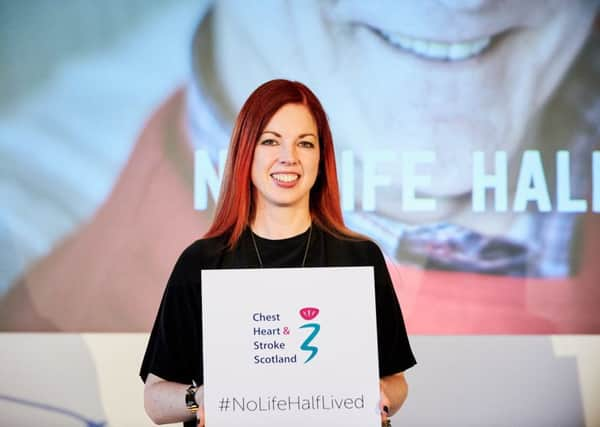Jane-Claire Judson: Help Chest Heart and Stroke Scotland make our service better


The Chief Medical Officer’s focus is on achieving Realistic Medicine, in recognition of the importance of shared decision making by patients and health professionals.
There is still a long way to go in achieving the transformative change we all want to see in our NHS and care system – a system that is large and has many elements to it.
Advertisement
Hide AdAdvertisement
Hide AdChest Heart & Stroke Scotland’s ambition as a health charity is to be led by our people – the one million people in Scotland who are living with our conditions, their families and carers, friends, colleagues, and health professionals.
We want the work that we do to fit around people’s needs – not for them to try to fit neatly into the services available. We want to give people a voice so that they can have a say in the decisions that affect them.
The first step in that – and the most important – is being a good listener. We know we’re already good at that at an individual level. Our stroke nurses, for example, help identify people’s needs and goals and build their support in the home around those.
Our rehabilitation support team and volunteers ask people what matters most to them, so that with the right support, people can regain the confidence to catch a bus to the shops, go back to work, or read a book again.
To learn and listen on a far bigger scale and reach many more of the one million people affected, over the summer we are undertaking a national survey of people’s lived experience of our conditions.
We want to hear from anyone with conditions such as asthma, COPD, heart disease, or after a stroke or TIA (a ‘mini-stroke’), about what the impact on their lives has been.
For some people, their health may have affected their relationships with friends and family.
For others, it may have limited their ability to drive, to get out and about and participate in the things that we normally take for granted such as meeting friends or doing the shopping.
Advertisement
Hide AdAdvertisement
Hide AdWhere someone’s health condition means it is difficult for them to work, or their employer hasn’t made adjustments to help them return to work, it may be that their finances or coping with work are their biggest concerns.
We also want to know what support or advice is most important at different stages in people’s journey – anything from the care and treatment by NHS professionals, through to family and friends, or social media. What do people need more of? What are the advice or support services that they’ve been unable to access, and why?
The responses to the survey will inform the publication later this year by Chest Heart & Stroke Scotland of a national report. Our aim is to help bridge the gap between what people want, and the processes and leaders who can make that happen.
When we look to our own services, we will place our focus on addressing the unmet needs of people with our conditions – social, emotional, and physical – across all of Scotland’s communities.
We are working with people and their lives – not just a condition, not a policy, not a statistic, not just a problem to be solved. There will be no life half lived because we will make it a matter of life and health and the voices of our people are informed, heard and supported in decisions that matter to them. To respond to our survey see www.chss.org.uk/surveys
For advice and information on any of our conditions use our Freephone advice line service – 0808 801 0899.
Jane-Claire Judson, chief executive, Chest Heart & Stroke Scotland.